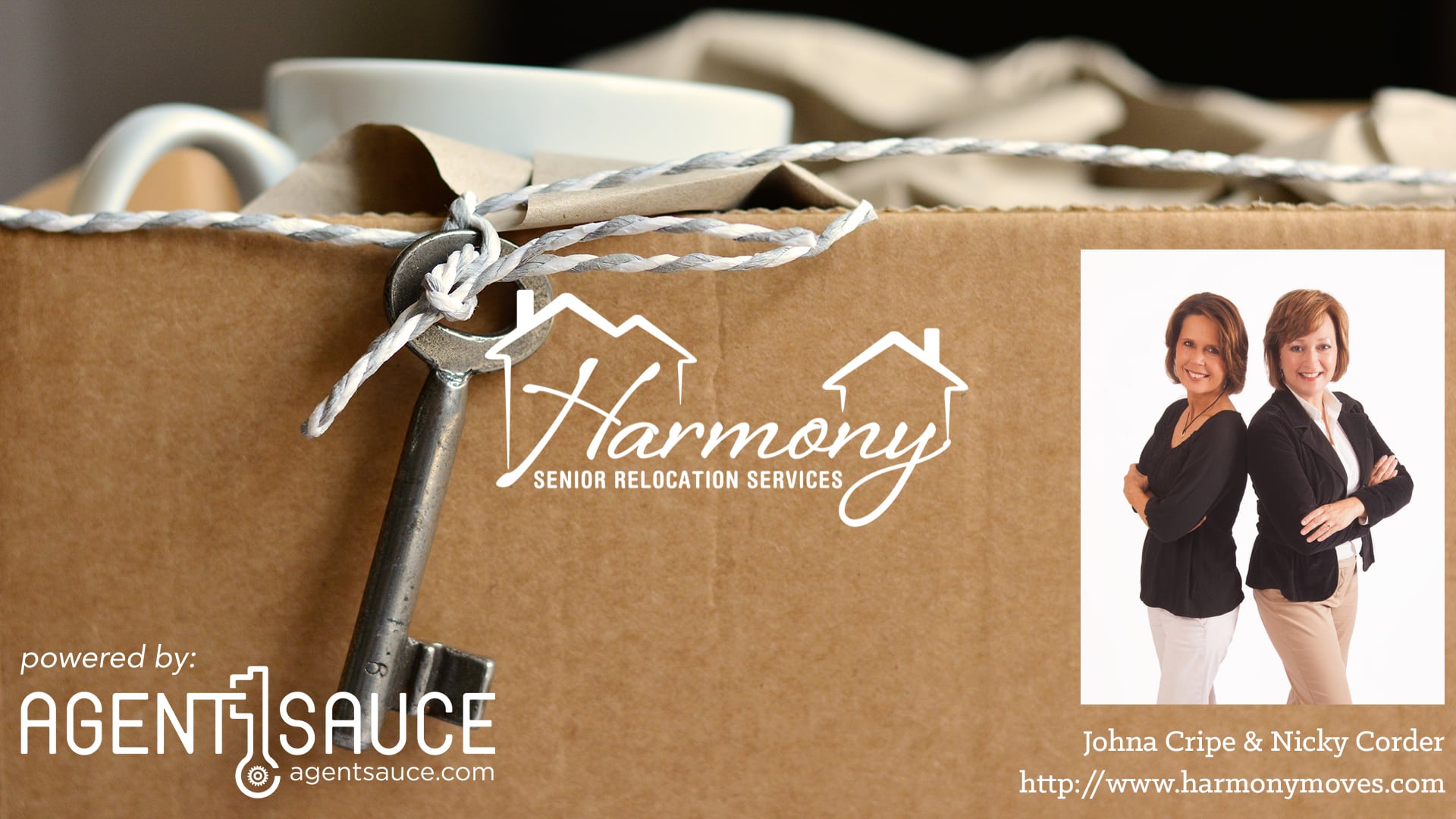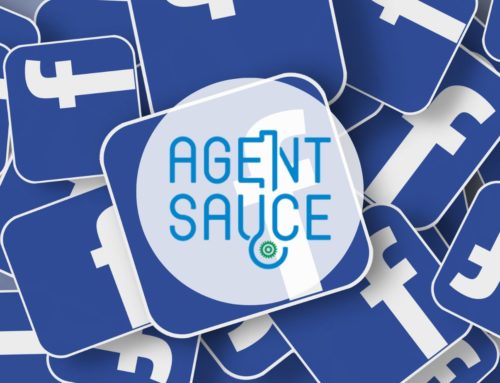An enlightening interview with Johna Cripe and Nicky Corder on the Senior Relocation services that Harmony Moves offers. A must listen for any real estate agent.
Senior Relocation Services Links
http://www.harmonymoves.com/
https://www.nasmm.org/
Senior Relocation Services Podcast Transcript
Adam Small: Hello and welcome to the Real Estate Marketing Minute. This is Adam Small, your host, and with me as always, with a face made for radio, is Doug.
Douglas Karr: That’s me. The body matches.
Nicky Corder: No comment on that.
Douglas Karr: The body matches.
Adam Small: The body matches, there you go. And we have Kimberly Small from Agent Sauce in the room with us.
Kimberly Small: Hi, how are you?
Adam Small: Doing well. And we have some special guests today. We have the owners of Harmony Moves, Johna Cripe and Nicky Corder. Hi.
Johna Cripe: Hello.
Nicky Corder: Hello.
Adam Small: How are you guys today?
Johna Cripe: We’re good. Thank you for having us.
Adam Small: Yeah, thanks for being with us. Really appreciate it. So, let’s just make sure that I get this right because on the notes that I have here, it’s a Harmony Moves. But then on your material, I’ve got Harmony Senior Relocation Services. So, is it Harmony Moves or Harmony Senior Relocation Services?
Johna Cripe: It’s Harmony Senior Relocation Services. We help families and seniors when they are downsizing and moving to a smaller home. Certainly moving is part of that. But as Senior Move managers, we help in all aspects of the relocation process.
Kimberly Small: So I familiar with your services because a friend of mine had the opportunity to use you guys to help their dad move from a four bedroom house to a one bedroom apartment and I think people think that they’re working with family. They can do it themselves and help their own family and that they’re the best person for the job. And that’s not always the case. I know that they tried to help them for several weeks or several months even. And then you were able to come in and get the job done very quickly and efficiently and not only get them moved and downsized and make sure that they kept the things that they wanted to keep and we’re able to sell things that they didn’t want anymore or donate the things that they didn’t want anymore. But you also helped them set up their new home, which is all part of the process. So tell me a little bit more about how you talk to people about your services so they really understand the value of you coming in versus having family members help.
Adam Small: Well, what it is you do and the value.
Johna Cripe: Sure, sure, we’d be happy to. Well, often times, a family is very involved with a senior when they are downsizing and relocating, and at the same time, families are very busy, too. They want to help, but they’ve got a lot of other things going on in their lives.
Adam Small: They’ve got their own jobs and kids and events an stuff to go to, right?
Johna Cripe: Exactly. And also just from a relationship standpoint, it can be difficult even in the best of relationships to be able to advise your parents on what they need to let go of, what they might need to consider selling, what we consider might be just stuff, is very meaningful, memorable, possessions for them. And it can just be a delicate situation. So as a Senior Move Manager, we can come in and help those seniors with guiding questions, with an objective perspective, to help them walk through and decide on their own what possessions are going to be fit in their new apartment, what things that they need to let go of, and just help guide them through that process, where it might be just a little more challenging for family members who are just too close to the situation.
Adam Small: So let’s talk for more about your process when you actually go into a place. How do you help a senior decide what to keep, what kind of buckets? First of all, what are the buckets that you put it into? Is it what you keep, what you throw out or whatever? And how do you help somebody through that process? Because like Johna said, I’m sure that emotional attachments are very hard, especially if you’re leaving a home you’ve lived in for 30 years, that thing in the corner and everybody thinks is a piece of junk may have some real sentimental value and is actually probably magnified by the sheer fact that you are leaving your environment. So how do you guys help somebody work through that process and what kind of buckets do you put things into in order to get that downsizing process down easy?
Nicky Corder: So at harmony we like to take our clients through the process of going to each room, discussing with them, and sometimes physically labeling the things that they love, and the thing that they know they want to take with them to their new home. At that point, we may have a sorting session with them. We do put things in separate buckets, what to keep, what to donate and what really should just be in the trash.
Adam Small: Okay.
Nicky Corder: So those are the three buckets that we typically use. But our main focus, again, is just having the senior focus on what makes them feel good, what makes them have joy in their life, when they look at a specific object, whether it is a sentimental item or maybe something that was given to them by family members. We really try to help them focus on keeping those types of things and just letting go of the things that don’t have as much meaning or value.
Adam Small: Okay. So, you focus on the sentimental things. The things have emotional and sentimental value then. And you said that you do donate and then trash, right? So you go through this whole process and you’re sorting things out. Do you ever do like a sell bucket?
Nicky Corder: We do, yes. We have a sell bucket. Sometimes at the beginning of the process we’ll talk with the client about an estate sale or about some type of auction house or we’ll talk to them in that regard. And that might be an option for them. At the very beginning, we would then tag the things that they do love and want to keep and cherish and then the things that they’re willing to let go of, we can help them decide how best to do that.
Adam Small: Okay. And so if you do a sale, do you guys coordinate that as well?
Nicky Corder: We can.
Adam Small: Okay.
Nicky Corder: Yes.
Adam Small: And so then when everything’s all sorted out, what happens?
Johna Cripe: Well, in the sorting process, one key aspect in that transition and thinking about their new home is what’s gonna fit in the new home. Typically, for all of us, when we’re moving to a new home, we’re moving to a bigger and better home and we’ve got plenty of storage and we don’t have to think too much about not taking things, but when seniors are downsizing, they really have to be mindful of this new space and what furniture is going to fit, how much drawer space they’re going to have, the size of their closets. We help them at the early sorting stage by knowing and being mindful of what is their new home look like. And sometimes we’ll physically measure out the length of hanging space in their closet and visually help them see that, okay, right now you’ve got 16 feet of hanging space in your walk-in closet. Your new home is going to have eight feet. So we need to sort your clothes down so that you have eight feet of hanging clothes left. And when you can put the sorting decisions into an objective, almost mathematical decision, it makes it really easy for the senior to understand and be realistic about what they need to keep and what they need to let go of.
Adam Small: Right. So how does it work on a nationwide basis? I mean, a lot of people will downsize kind of in their same town, but then a lot of seniors say, I’m done. I’m moving to Florida. So do you guys work with that on a nationwide basis?
Nicky Corder: Yes we do. We are a part of a national organization called NASMM, National Association of Senior Move Managers.
Adam Small: Okay, didn’t even realize that there were organizations like that, businesses that do that, much less a national organization. So that’s a really great thing.
Nicky Corder: It is a great thing. And they provide a lot of really good resources for you and for the Senior Move Manager, it is a website that anyone can go to and you can look on there and actually find a Senior Move Manager in your area who can help your family on the front end with the states sale, the packing, whatever needs to happen there. Then they’ll coordinate it with us here in Indy or vice versa from Indy to Florida, wherever. And so we worked together.
Adam Small: So you can literally take it from Indy to anywhere in the country because there are other companies like yours that are a member of this organization.
Nicky Corder: We can. Yes.
Adam Small: NASMM, is that what it’s called?
Nicky Corder: Yes. National Association of Senior Move Managers, that’s right.
Adam Small: Yeah.
Johna Cripe: And just to add, you know, obviously we’re here in Indianapolis, but any pairing can happen. So moving from Colorado to Florida or New York out to Texas. Senior Move Managers that are members of NASMM coordinate back and forth quite a lot and the value of working with a NASMM Senior Move Manager is that, you know, that all of these businesses have been expected to adhere to a certain code of ethics, a certain level of professionalism, a high standard of service because all of our individual businesses, generally it’s women, not always, but we all know one another and we’ve gotten to know each other over the years through our annual conferences and it’s just a high level of customer service and you can be confident in that.
Adam Small: So is this a fairly new industry then?
Johna Cripe: It’s not new, it’s probably been around for about 20 years, but I think the awareness and the need has really taken off now that the baby boomers are turning 70, 72-
Adam Small: So it’s emerging.
Johna Cripe: It’s a very strong emerging industry. There are so many new retirement communities that are being built in our community and all across other communities that give seniors an option for downsizing, you know, no longer do our grandparents just stay in the home that they’ve lived in forever and there’s just a lot of wonderful options for seniors to downsize. So it’s a lot of choices for seniors.
Kimberly Small: So how did the two of you get into this business and how long have you been doing it?
Nicky Corder: Well, we’ve been in the business for about three years and it started from some personal experience. My in-laws were downsizing. They had lived in a large four bedroom home for about 25 plus years. They had a lovely home, but they had also become the home base, if you will, for their aunts and uncles and parents who have had passed away. They’d become kind of the home base for all that extra furniture and boxes and they had a really full house. They had a full house, they had a full basement. They had a full two car garage, so full that they parked their cars in the driveway and not in the garage. And my husband and I helped them over the course of a summer to downsize and move into a smaller home. And it was through that process that I just discovered what a need there was for seniors.
Nicky Corder: I became personally aware of how overwhelming it can be. I became personally aware of how big the task is, how time intensive it is, and I just got to thinking, wow, my dad doesn’t live here in Indianapolis. He lives in Alabama. When he needs to downsize, how am I going to get down to Alabama every weekend over the course of a summer to help him take things to Goodwill? So a lot of families live out of state and need help. So it was just through that process that I realized that there was a need and from there, Harmony was born.
Kimberly Small: So how did you get started? You talked about the national organization. Do they provide training to you?
Nicky Corder: Yes. NASMM has a lot of great tools on their website. That’s the first step. We went to NASMM, we joined NASMM, we bought the training. We completed the training and then we started going to the national conferences every year. A very supportive group of mostly women, but people, very supportive and we learned a lot about the business through them, through their mentoring and through just time spent on the website as well.
Adam Small: So what are some of the differences between, you know, like just hiring a moving company versus working with you guys? You know, because a moving company, I’ll take all your stuff from one place to the next. So you know, what are the advantages of working with you guys? What’s your differentiation?
Johna Cripe: Yes. Moving your furniture from point A to point B is certainly part of the service that we provide and movers do a great job with that. What we offer as Senior Move Managers is a broader, more encompassing service than what a basic move company will offer. We’re going to help with a lot of the upfront planning, the sorting, the determining of what furniture is going to fit in the new space. We completely unpack and put away all the items. Moving companies will unpack you, but they unpack to a flat surface. We unpack and put your dishes back in your kitchen cabinets. We put your figurines and sentimental items back into your curio cabinet.
Adam Small: So you move from one home to the next, meaning that it’s move in ready instead of walking in and going, oh wow, I got to put everything away now.
Johna Cripe: Exactly. When our clients walk into their home at 5:00, at the end of move day, and generally they’ve been out shopping with their adult children. They’ve been running some errands. They’ve been off to get a manicure. True story. But they’re usually not there on move day. And so they’ll come home at 5:00 at the end of move day and they will walk into a home that is completely functional, organized. It’s familiar, it looks like home.
Adam Small: Just a different home, right?
Johna Cripe: It’s just in a different location, but it’s their home. Their pictures are hanging on their walls. We’ve already put the fresh sheets on their bed, their television is reconnected, their telephones are up and running. They walk into-
Adam Small: That’s a whole lot different than a moving company, that’s for sure. So anybody that’s ever had to use of a moving company knows that even if they unpack it, they just dump it and go.
Douglas Karr: I had a moving company that held my entire house for ransom because there was one more step than the contract stated. And so we had to fight over the dollars per step.
Nicky Corder: We don’t do that
Adam Small: Well, that’s good to hear. So, okay. So, there’s a huge difference between you guys and a moving company and it really seems like a very personal touch to make that transition so much easier, as opposed to walking into a place that you then have to turn around and get all set up again. So that’s a really a great advantage to using you guys if you asked me. What about certifications, does the NASMM offer certifications? Are you guys certified, you know, and, and what do those certifications, what kind of areas did those certifications cover?
Johna Cripe: Yes, there are a couple of certifications offered by NASMM. There is the SMMC certification, Senior Move Manager Certification. There is also NASMM A Plus Accreditation and they each have their own individual criteria for achieving those certifications. NASMM, as I mentioned earlier, is really focused on education and training and experience. And there are a number of cornerstone courses that to just even be a member of NASMM, one has to complete.
Adam Small: Okay so it’s not just like you pay 25 bucks and join.
Johna Cripe: Not at all.
Adam Small: You actually have to complete the training too.
Nicky Corder: You do.
Adam Small: So that really speaks a lot for Harmony as an organization, that you guys are in fact members of this national organization. Right?
Nicky Corder: It does, and there are many companies out there who aren’t a part of NASMM and aren’t held to the same standards. We try really hard to comply because we understand that sometimes the elderly population can be taken advantage of and when you’re held to a standard and you’re being watched, that just makes you accountable.
Adam Small: Right. And that’s great. Our primary audience here on the podcast is real estate agents, right? And as a real estate agent, you know, all of them have a to pass certain local, as well as state level and national level boards and exams and stuff like that in order to get a license. So for a real estate agent to wanna work with somebody, the certification is really important to them and knowing that you guys have that at Harmony would probably make a great big difference in picking you over somebody else, you know. So, do you work with a lot of real estate agents? Let’s talk about that for a moment.
Johna Cripe: We do work with a lot of real estate agents and the benefit for a real estate agent in working with a Senior Move Manager is on the upfront, planning of getting a house on the market. Oftentimes, seniors know that they need to move into maybe a retirement community or assisted living. They know from a health standpoint that it’s time. They know that they can no longer do the maintenance on their home and all of that is overwhelming. And yet when they walk around their home, they’re often so overwhelmed, and we kind of jokingly call it the pile in front of the door, because they just can’t envision themselves at 80 or 85 or their family who lives out of state, it’s like how am I going to get this done? And for the real estate agents, it can be difficult to get that house listed and on the market when the client is just not physically and sometimes emotionally ready to tackle such a big task. So we can help on the upfront
Douglas Karr: You can really smooth that process out on the front end for a real estate agent just to get the house to market.
Johna Cripe: We can smooth it out and we can speed it up. Yes, because we want to get the house ready to list. We want to get it ready for the photography. We want to get it decluttered, things packed up, things streamlined. And in some cases, the senior will go ahead and move out of the house and into their new retirement community, and then sell the house. And so to be able to get them moved and settled into a new place, it makes it so much easier for the realtor to do showings, to do any potential repairs that need to be happening, because they know that their client has already moved on into the next phase of their retirement.
Kimberly Small: So do you have different packages that you offer your clients? So, if they just need a little bit of help to downsize some items, figure out where they can sell things and that kind of stuff. What’s the gamut of what you offer and pricing for that?
Nicky Corder: Okay. So we offer as much help or as little help as you need. We do sort of have our services grouped in packages if you will, just to make it simpler, but we do help you with as much or little as you need. Some folks have family that come in and do a lot of the packing. Some folks don’t. So when that’s the case, Harmony can come in and assess that situation. Most Senior Move Managers give a complimentary assessment, a complimentary first visit to just see what we’re working with and what kind of family member help that we have.
Nicky Corder: And at that point we can decide the services that are needed, and how much of the services that they want to hire Harmony to provide. We can do what we like to call the get me started package, which is sort of a timeline that we can set up for your move. We can give you the necessary information that you need, tips and procedures for decluttering and just help you in small ways to sort of get you started. And then we have what we like to call our hold my hand package, where we offer two or three rooms of sorting and decluttering, and we offer a floor planning and furniture suggestions for your new space. And then that also includes the packing and then the unpacking as well.
Nicky Corder: Our favorite one is the Do It For Me where we can just come in and just sort of take that burden off the shoulders of the family and the client. So we would come in and manage the entire process at that time, from the space planning to the arranging for the mover, for the arranging of any kind of estate sale, for the packing, the unpacking, then setting up the new home. We actually oversee the whole move day. Your belongings are always being overseen by one of our team members. So we oversee the entire move day and on move day, we unpack everything and we get you completely moved in, so that on move day, you come in and it’s completely ready for you.
Douglas Karr: I’m curious on the front side of this. We talked before the podcast, don’t mention my mom. I’m going to mention my mother.
Adam Small: No, it actually wasn’t a don’t mention your mom. It was be nice to your mom.
Douglas Karr: Well, my mom is one of those independent women, you know, she’s absolutely loves her independence. She lost dad a few years ago, figured out that she can do it on her own. She can do it all, you know, kind of thing. And of course as a son, I don’t want to be pushy with her. So I’m curious, like the the opening conversations that you have, you know, are these people that are already bought in, they’re already set, they’re going to move, everything else. Or do you sometimes come in earlier, you know, to have a chat with someone about downsizing or anything?
Johna Cripe: Well, we’re generally contacted either by the senior individual themselves or their adult children, or the realtor, once they’ve made a decision that they are going to be moving, but they don’t know how to get started. They’re overwhelmed by getting started. They’re just not even sure what to do to get started. So we’ll come in and generally the conversation starts with “Tell me about your upcoming transition,” and we just go from there to see what they need.
Douglas Karr: Really just to put them at ease, that it’s going to be a comfortable move and they don’t have anything to worry about. That’s awesome.
Johna Cripe: Exactly.
Adam Small: Yeah. Cool. What kind of questions should somebody ask when looking to hire a Senior Mover Management or Manager?
Johna Cripe: Some of the key questions to ask, you know, obviously you want to know how long someone has been in business and what kind of experience they have. You would want to ask them if they are a member of a national association or they just kind of a small mom and pop type organization. You would want to ask them about their training and their professional training that they’ve received. You want to ask them about what type of insurance and liability coverage that they have. I think one of the most important questions to is just in that initial meeting, do you feel comfortable with these individuals, you know, inviting them into your home.
Douglas Karr: That’s sort of a question to ask yourself.
Johna Cripe: Yeah, exactly. You’re going to be packing up somebody’s underwear and so you want to make sure that who you hire is somebody that you’re comfortable with and you’re going to be spending some time with and that you feel like they’re going to put your needs first. Our clients are always the ones making the decisions about what they’re downsizing and sorting and moving too, we just help provide some gentle guidance and expertise to help them think through those decisions and make good decisions.
Adam Small: Okay. So from a cost perspective, like a stage or we’ll get I think it’s a percent, one percent or something like that of the sell price, that sort of thing. How does it work with Senior Mover Managers. Sorry, I want to put the two Senior Move Managers. So how does that work? Do you guys do a flat fee? Do you do an hourly fee or is it a percent sale? How does that work?
Johna Cripe: Once we’ve met with the clients, and they tell us what their needs are in terms of the areas of service, where they’re feeling overwhelmed and where they feel like they need some additional support, we will think through those services and provide them with some estimated range of ours that we feel like it’ll take to complete it. We’ve got a lot of experience with clients and so can kind of compare from one job to give a really pretty tight estimate on the hours, but we give them a range. There’s always some unexpected things sometimes that come up and that gives them an idea of what the budget might be.
Adam Small: Okay. So let’s dig in a little bit there. Yeah. So like an average home, three, four bedrooms, couple of baths, that sort of thing and say across town, is there a range, a high and a low, that you feel comfortable saying? If not, we can cut it out.
Johna Cripe: Well, it’s really tricky to be able to give a range like that because not every three bedroom ranch home is the same. Some people are minimalists and maybe they’ve already downsized once.
Douglas Karr: And then some are hoarders, right?
Johna Cripe: Some have more stuff. This is how it’s just really hard. So it’s just hard to give a generalization. But I’ll share with you, in some cases, somebody might only need a few hours of sorting services and that might be as little as two or $300 for a couple of days of sorting services. Someone else who is downsizing from a four bedroom house, maybe they’ve already done most of their sorting, but they’re moving into a smaller two bedroom home, that might be more like 5 or $6,000, so it really can-
Douglas Karr: So there’s a wide range, but it’s all dependent upon the services that they’re taking.
Johna Cripe: It all depends on what they choose and what their budget can accommodate and what they and their family are able to do themselves.
Douglas Karr: So a lot of it’s really flexible.
Johna Cripe: Very flexible.
Douglas Karr: So it could be very low cost while still taking advantage of the expertise that you guys have, if you’re doing most of the work yourself, but then lean on you guys for the stuff that you don’t know how to do. Or, all in and you guys just run with it, right?
Johna Cripe: Yes. Absolutely, we’re happy to do it all, but we’re also happy to give you some homework assignments.
Douglas Karr: Good, good. So anything else that you guys want to add?
Kimberly Small: What kind of timeframe is it to downsize a senior from their home and what can they expect? Use the example of the four bedroom home to a one bedroom place. Let’s just say they’re middle of the road. They have a lot of stuff. Not too much, but they haven’t really done a lot to downsize themselves. So what kind of timeframe do you work under?
Nicky Corder: Well, if we’re going to be downsizing as someone at Harmony, typically we like to do a two day pack and move. So two days. If it’s a large home, we will set up some sorting sessions in decluttering sessions ahead of time before that. Some larger homes might need a two day pack if we’re not downsizing, but we’re strictly packing and moving everything that’s there, it might be a two day pack. But our goal is to get your family moved and settled within two to three days.
Kimberly Small: Wow, that’s amazing.
Douglas Karr: Yeah. So that … Wow.
Adam Small: I guess part of that too is it’s another thing that’s just easier, right?
Nicky Corder: It does.
Adam Small: If you drag it out for a senior, it could really be a traumatic experience.
Nicky Corder: It can be a traumatic experience and tiring and emotional. And so typically, our sorting sessions are three hour sorting sessions. We might have to have two or three of those in the process, but we would spread those apart. But on the actual move day, yes, it is one of the perks of hiring someone to do this. It does not drag out for weeks and months.
Adam Small: You guys know what you’re doing. You get it done, right?
Nicky Corder: We go in, we get it done, and then we get out and let you enjoy your new home.
Douglas Karr: Great.
Kimberly Small: And that’s great to be able to have somebody with that skill set. I think when you’re talking with family members too, a family member could say, hey, you need to downsize. Maybe you should get rid of this. And their response is not as positive as to if you went in, when you have that skillset, you know. We talked about can you tell a kid something, so they tell you, oh, so and so said I should do this.
Nicky Corder: I said that yesterday!
Kimberly Small: Exactly. And it’s kind of the same with parents being able to go in and do that and basically magically make it happen. Hopefully they skip the process of trying to do it themselves first.
Johna Cripe: Well, it’s just a different dynamic. I mean, I think we all know that sometimes we’re each and all harder on our family members then we are our friends, sometimes. So to be able to call in an expert and to have a Senior Move Manager walk your parents through some of the decisions, some of the timelines, and ask the gentle but nudging questions on downsizing, it could make it a lot easier for everybody in the family.
Adam Small: It puts a lot more objectivity into it as opposed to subjectivity because you’re right, you’re generally a little harder on your friends and family when they start saying you need to get rid of that thing.
Douglas Karr: And we’re not experts, right?
Adam Small: Right.
Douglas Karr: You know, friends and family that haven’t been through this before, most of the time.
Adam Small: Right. And so I think it’s really important that you probably look better as a kid saying, hey, I brought in an expert to help you.
Nicky Corder: Well too, we don’t have the emotional attachment and the past relationship.
Adam Small: Right, right.
Nicky Corder: That we’re all dealing with. We come in, like you say, as the expert, and we’re completely objective. We don’t have any skin in the game as you would say. We just come in and we have a job to do. And it’s not personal and with family members it often gets personal and emotional and so we like to joke that we’re saving relationships one family at a time.
Douglas Karr: I swear, I’m really not trying to get your couch out, you know?
Johna Cripe: When we work with seniors in the sorting and downsizing process, it is always their decision. It’s not Harmony that’s telling you you need to get rid of this or you need to keep this.
Adam Small: Right.
Johna Cripe: They’re making the decision. We’re just helping them to come to the decisions on their own with some guiding questions, some practical suggestions. It’s always their decision.
Adam Small: Yeah. And that’s good. You know, that’s what it should be, right?
Kimberly Small: So, we want to make sure that real estate agents or anybody that’s in need of your service, locally in Indianapolis, are able to get ahold of you. So if you can provide your contact information, and then if they’re not in Indianapolis, if you can provide contact information for the organization so that they can find somebody in their area.
Johna Cripe: Yeah. So in the Indianapolis area, we are Harmony Senior Relocation Services and our website is www.harmonymoves.com. I’m Johna Cripe and Nikky Corder, we are the owners of Harmony and if you are not in the Indianapolis area, the NASMM website is www.NASMM.org. That’s NASMM.org and that will get you to the NASMM site where you can look for a Senior Move Manager in your area.
Adam Small: Anything else? No. Well thanks for listening guys. Really appreciate Johna and Nikky coming in and talking to us about their business Harmony Senior Relocation Services and making us aware. Have a great day.
Nicky Corder: Thanks for having us.
Adam Small: Thank you.
Johna Cripe: Thank you.







